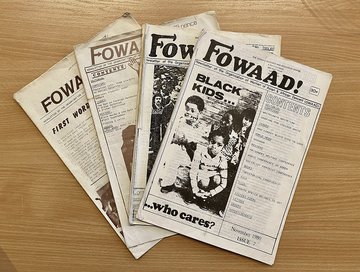
OWAAD
‐
Pioneering feminist activist organization which worked nationally to address the intersectional needs of racialized minority women
Location(s)
41A Stockwell Green
Black Women's Centre
London
SW9
United Kingdom
About
OWAAD (Organization of Women of African and Asian Descent) was founded during a meeting in Coventry in 1978, by radical activists and community leaders Stella Dadzie, Olive Morris and Gail Lewis, as well as other Black women who were members of the African Students’ Union. Those present at the meeting included representatives of organizations such as the South African Women’s Self-Help Alliance and the Ethiopian Women’s Study Group UK. The discussions generated during this and subsequent meetings highlighted the marginalization of Black women in the Women’s Liberation Movement and the movement for Black self-determination in Britain, as well as the disregard for their political and intellectual capabilities. Moreover, the overlapping struggles of Black and South Asian women became increasingly apparent. OWAAD was therefore formed as an independent, national umbrella organization, and its purpose was to address the specific needs of Black and South Asian women, which OWAAD described in their founding constitution as the triple oppression of race, sex and low socio-economic status.
Prior to founding OWAAD, its founders were part of important activist organizations, particularly in London. Stella Dadzie, for example, founded the United Black Women’s Action Group in Haringey, whilst Olive Morris had a long-standing association with the British Black Panthers, was a founder of the Brixton Black Women’s Group and, as a student, was a member of the Manchester Black Women’s Co-operative. OWAAD’s national reach meant the organization could build connections between these siloed women’s groups, and in turn continue the significant work of advancing the Black women’s movement.
On 18 March 1979 OWAAD organized the National Black Women’s Conference, the first Black women’s conference, at the Abeng Centre in Brixton. Approximately 250 women attended to discuss issues that were specific to their experiences of racism and sexism. These discussions centred around themes such as education, employment, health, imperialism and immigration. The conference marked an important turning point in inspiring localized activism. OWAAD launched a newsletter titled FOWAAD, to engage with emerging local women’s organizations and promote key issues, new scholarship and relevant campaigns.
In July 1979 OWAAD, alongside the South Asian women’s group Awaz, which was founded by Amrit Wilson, organized a sit-in at Heathrow Airport in response to reports of virginity testing on incoming South Asian women. In addition, OWAAD played an important role in the campaign against Depo-Provera, an injectable contraception that was disproportionately tested on and prescribed to Black and South Asian working-class women despite safety concerns. The organization also resisted the National Front in Southall when the New Zealand activist Blair Peach was murdered.
OWAAD ended after five years in 1983, in part because its broad reach resulted in conflicting ideas about the nature and function of Black women’s collective action. In 1985 Stella Dadzie, along with Brixton Black Women’s Group co-founders Beverley Bryan and Suzanne Scafe, wrote and published a socio-historical book titled The Heart of the Race: Black Women’s Lives in Britain with Virago Press. Research for the book began in 1981, before OWAAD ceased operations. The book, which was a critical success and won the Martin Luther King Memorial Prize, highlighted the wide-ranging personal and political struggles of Black women and centred Black women’s lives in the history of Britain. It has since become a classic feminist text and the book was republished in 2018.
Stella Dadzie, Gail Lewis, Olive Morris.
Awaz, Southall Black Sisters.
The Heart of the Race: Black Women’s Lives in Britain (London: Virago, 1985)
Al-Hassan, Salma, ‘Black Women Organising: What We Can Learn from the Rise and Fall of OWAAD’, History @ Manchester (1 October 2020), https://uomhistory.com/2020/10/01/black-women-organising-what-we-can-learn-from-the-rise-and-fall-of-owaad/
Brah, Avtar, ‘Difference, Diversity, Differentiation’, International Review of Sociology 2.2 (1991), pp. 53–71
Lambert, Caitlin, '"The objectionable injectable": Recovering the Lost History of the WLM through the Campaign against Depo-Provera’, Women’s History Review 29.3 (2020), pp. 520–39
Mirza, Heidi Safia, ‘Introduction: Mapping a Genealogy of Black British Feminism’, in Black British Feminism: A Reader (London: Routledge, 1997), pp. 1–31
Murphy, Gillian, ‘The Beginnings of Women’s Liberation in Britain’, LSE (17 March 2020), https://blogs.lse.ac.uk/lsehistory/2020/03/17/the-beginnings-of-womens-liberation-in-britain/
Nasta, Susheila and Stein, Mark U. (eds) The Cambridge History of Black and Asian British Writing (Cambridge: Cambridge University Press, 2019)
Thomlinson, Natalie, Race, Ethnicity and the Women’s Movement in England, 1968–1993 (London: Palgrave Macmillan, 2016)
DADZIE/1/1, OWAAD Draft Constitution (1978), Papers of Stella Dadzie Collection, Black Cultural Archives, London
DADZIE/1/8, The Heart of the Race: Research (1981), Black Cultural Archives, London
DADZIE/1/1/14, Papers and Photographs from the National Black Women’s Conference (1979), Black Cultural Archives, London
RC/RF/23/01/A, Black and ethnic minority women – general 1985 – 1995, Black Cultural Archives, London
NEW/39, Newsletter of the Organisation of Women of Asian and African Descent (OWAAD), George Padmore Institute, London
IV/279, Olive Morris Collection, Lambeth Archives, London
IV/279/2/8/1-5, Interview with Stella Dadzie, Lambeth Archives, London
Image credit
Spread of the magazine FOWAAD displayed at the Feminist Library. Photo by Esm3goes via Wikimedia Commons, CC BY-SA 4.0, https://creativecommons.org/licenses/by-sa/4.0/
